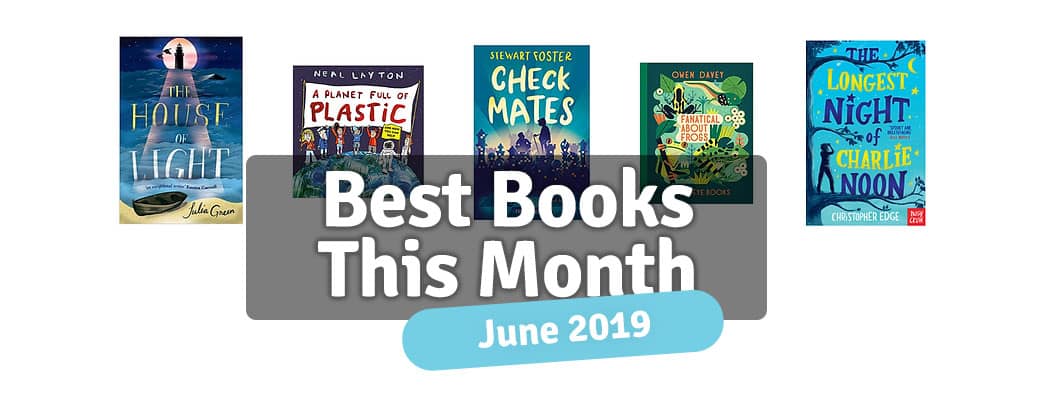It’s easy to feel lost in the flood of so many new children’s books available. Each month, we pick five of our recently published favourites.
Check out our Review Panel’s top picks for you to read in June 2019…


It’s easy to feel lost in the flood of so many new children’s books available. Each month, we pick five of our recently published favourites.
Check out our Review Panel’s top picks for you to read in June 2019…
The House of Light is a gorgeous book, which skilfully blends stirring descriptions of the natural world with the drama and excitement of a dystopian adventure and a deep emotional meditation on the value of those we love, those we lose and those we leave behind.
Bonnie lives with her Granda by the coast in a not-so-distant future Britain where freedoms have been curtailed and the right to travel has disappeared, along with much of the technology we currently enjoy. Despite the loss of her mother at a young age and a hankering for adventure, Bonnie is generally happy in her loving home with Granda; growing their vegetables, tending their hens and telling stories. Until the arrival of a boat and a boy widens her mind to the possibility of following her mother over the sea and escaping to a better life.
The relationship between the boy, Ish, and Bonnie develops beautifully from mistrust and fear between two damaged children to a deep empathy and indestructible bond. They are young, they are resilient, and they will risk anything to seek wider horizons. Granda, however, is at the opposite end of his journey, his physical horizons narrowing but his yearning for freedom as strong as ever. The final chapters of the book are heart-breaking and uplifting in equal measure.
The House of Light is a beautifully crafted work, one of Julia Green’s best yet, and my favourite book of 2019 so far. The accessible and well-paced writing, the poignant characters and storyline make it almost impossible to put down. I will be pressing it fervently into the hands of KS2 readers who need to believe in the ability of compassion and hope to overcome darkness and fear.
Reviewed by: Carol Carter, Librarian
This is an information-packed picture book that draws attention to just how many everyday objects are made of plastic. From plastic straws and food wrapping to ketchup bottles and cat toys, there is no denying that plastic is all around us. The book walks through the history of plastic production and introduces the problem with materials that are not biodegradable. What’s more, through photographs, illustrations and child-friendly diagrams, the author explains that much of the plastic ends up in the ocean in enormous garbage patches (the most famous of which is currently three times the size of France!).
Check Mates weaves together the stories of 11-year-old Felix and his lonely grandad in a heartwarming read full of empathy, humour and an encouragement to look beyond the unusual behaviour of others in order to connect with the human stories that lie beneath.
Readers of Stewart Foster’s previous books will have come to expect gritty real-life issues to be unpacked in a hugely compassionate and accessible way through the eyes of a likeable young narrator. This story is narrated by Felix, who struggles to concentrate at school and home because of his ADHD. The early chapters offer stirring insights into Felix’s thought processes and the sense of hopelessness that he feels at his own failure to stay out of trouble at school, ending up in an isolation room time and time again.
Mum organises for Felix to spend more time with his grandad, whose own eccentric behaviour has been increasingly concerning since Grandma died. Felix wonders whether he will ever connect with Grandad, who is often grumpy and likes to sit in the dark at home with the curtains closed. As they spend time together, Grandad teaches Felix how to play chess and the pair forms a bond that brings blessings to each of them in surprising ways.
Stewart Foster is skilled at bringing just the right amount of warmth and humour to his narratives in order to draw the reader to the heart of the issues explored without taking away their serious nature. Young readers will easily identify with Felix and his friend Jake, whose interests and mannerisms are typical of many young people their age. I liked the way in which digital technology was a very natural part of Felix’s lifestyle and was present throughout the story in a very relatable way. A less familiar historical element is also woven in too, with interesting threads about Cold War history that bring with them a number of pleasing plot twists and turns along the way.
Check Mates is a thoroughly enjoyable and thought-provoking read that will strike a chord with readers in the 9-12 age bracket.
Can an information book solely about frogs really be that good? Yes. It can and it is.
Although ‘Fanatical about Frogs’ is not the only book by Owen Davey on one particular type of animal (there are more in his series on sharks, monkeys, cats and beetles), it is the first I have read and it certainly won’t be the last. This fascinating book provides an excellent overview into everything you’d ever want to know about frogs in a child-friendly yet technical way.
Upon opening the book, the beautiful endpapers are striking and confirm the book is not just informative but also very artistic in style. The stylised illustrations throughout encourage the reader to look for the details more than a photograph of a frog might. My eyes were drawn all over the pages and I enjoyed looking for the nuggets of information scattered across the page.
As I made my way through the book I found myself looking up the various frogs and realised what a brilliant book this is in inspiring readers to look deeper. The information included within each section is just enough that the reader builds an understanding, yet not so much that readers won’t be inspired to go and discover more on their own. The book is not overloaded with content; the balance between the information and images is a good one and it is therefore a book that a whole range of reading abilities could access and enjoy equally.
This is a book that any nature-lover would likely enjoy and also a good choice for more reluctant non-fiction readers. The mix of thoughtful design and informative facts could provide young readers with a new way of seeing non-fiction books altogether.
Review by: Nathan Wilcox , Primary School Teacher
Atmospheric, intelligent and thought-provoking, this is the kind of story that loves to surprise you every time you feel sure you have a handle on it. At less than 200 pages, it is a quick but intriguing read in a similar format to Edge’s other recent science-themed books like The Infinite Lives of Maisie Day and The Jamie Drake Equation.
The initial premise of the plot is a basic one; three children get lost in the woods and desperately try to help each other to find their way home before the legendary Old Crony – whom they say eats children – makes an appearance.
Tapping into the natural world around them and putting their code-cracking know how to good use, the children find clues in the rhythm of birdsong and shapes of the sticks on the floor. As the story unfolds, so do a series of surprises and layers of philosophical depth as metaphysics are questioned and explored in a child-friendly manner.
Suspense builds with every page and the usual rules of time seem to become increasingly distorted as the story progresses. True to form, Christopher Edge weaves science and philosophy into a gripping child-centred story that keeps the reader guessing and puzzling until the very end.
The Longest Night of Charlie Noon is highly recommendable to KS2 readers who like their stories served with plenty of intrigue, puzzles to solve and a good dose of metaphysics thrown in.


© BooksForTopics 2015-2024
review
Year group(s) the book is most suitable for:
Year group(s) the book is most suitable for:
Does the book contain anything that teachers would wish to know about before recommending in class (strong language, sensitive topics etc.)?
Does the book contain anything that teachers would wish to know about before recommending in class (strong language, sensitive topics etc.)?
Would you recommend the book for use in primary schools?
yes
Curriculum links (if relevant)
Curriculum links (if relevant)
Any other comments
Any other comments